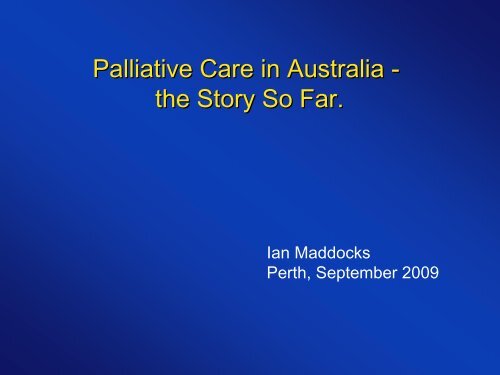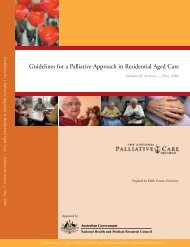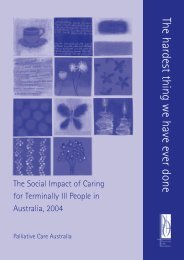Professor Ian Maddocks - Palliative Care Australia
Professor Ian Maddocks - Palliative Care Australia
Professor Ian Maddocks - Palliative Care Australia
Create successful ePaper yourself
Turn your PDF publications into a flip-book with our unique Google optimized e-Paper software.
<strong>Palliative</strong> <strong>Care</strong> in <strong>Australia</strong> -<br />
the Story So Far.<br />
<strong>Ian</strong> <strong>Maddocks</strong><br />
Perth, September 2009
‘<strong>Professor</strong> <strong>Professor</strong> <strong>Maddocks</strong> will discuss his role . . . .’. .<br />
Accidental<br />
Opportunistic<br />
Timely<br />
Fortunate<br />
Built on the important preparations by others . . .
Before the 80s<br />
Early developments<br />
1980s Increasing Interest from<br />
Government<br />
Universities<br />
Established Medicine<br />
Pharmaceutical Companies
Before the 1980s<br />
Influence of overseas advocates and exemplars –<br />
•Cicely Cicely Saunders: The St. Christopher’s Christopher s Model<br />
•Derek Derek Doyle: Intellectual Content (<strong>Palliative</strong> Medicine)<br />
•Balfour Balfour Mount: In Established Hospitals<br />
•Eric Eric Wilkes: Day <strong>Care</strong><br />
There were some <strong>Australia</strong>n attempts to follow models<br />
outside of established medicine: Mary Potter, City<br />
Mission, Theresa Plane<br />
Early government recognition gave different emphasis –<br />
eg SA 1990: ‘<strong>Palliative</strong> <strong>Palliative</strong> <strong>Care</strong> is an integral part of health<br />
care’, care , therefore a government responsibility for funding.
SOME AUSTRALIAN PIONEERS<br />
(very selective!)<br />
DAVID ALLBROOK: ACADEMIC, MRA<br />
ROSALIE SHAW: PERTH AND ASIA<br />
DOUG BRIDGE: PHYSICIAN, ASIA<br />
ROGER HUNT: NEW GRADUATE JOB?<br />
DAVID THORNE: GP<br />
NARELLE LICKISS: ONCOLOGY, RELIGIOUS<br />
TREVOR BANKS: GEELONG GP<br />
MARGUERITE ROBERTSON: BRISBANE<br />
SHIRLEY SUTTON: CANBERRA<br />
RUTH REDPATH: RADIOTHERAPY<br />
Different backgrounds, Common themes<br />
- cancer, religious conviction, maverick??
WA: Silver Chain an innovative <strong>Australia</strong>n model.<br />
The value of an integrated service<br />
South <strong>Australia</strong>: Hospital<br />
Home Hospice<br />
Finding that accepted place in established medicine:<br />
- Recruiting established individuals<br />
- Establishing training programs with University status<br />
- Providing a useful, used service
Tertiary Education<br />
University Chairs<br />
1988 Flinders University, then<br />
Newcastle: Peter Ravenscroft<br />
Monash: Michael Ashby<br />
NSW: The Sydney Institute<br />
AWARDS<br />
Grad. Cert., Grad. Dip., Master. Master.<br />
Doctorate<br />
ANZSPM created collegiality<br />
College of Physician recognition: FAChPM
SOME CURRENT ISSUES:<br />
Recognition and Government Funding -<br />
gained/lost something?<br />
Medications, especially Opioids<br />
too many Opioids?<br />
Privately-funded Privately funded palliative care -<br />
discrimination?<br />
Cancer/Non-cancer<br />
Cancer/Non cancer - <strong>Palliative</strong> Aged <strong>Care</strong>?<br />
Evidence - a valuable tension?
ISSUE 1. GOVERNMENT RECOGNITION<br />
Designated Funding for States, Federal.<br />
Emphasis on Data collection, Accreditation criteria -<br />
What are they doing, what does it cost?<br />
Cautious support for NGO Bodies - PCA ++<br />
•Generous Generous recent support for research projects, surveys,<br />
position papers on standards, training etc.<br />
•Ready Ready support for opioids and some special drugs; but<br />
concern re diversion/non-malignant diversion/non malignant pain.<br />
•Relatively Relatively frugal support for expanding services -<br />
understandable but sometimes frustrating.<br />
•Worrying Worrying example of Aged <strong>Care</strong> Facilities paperwork.
ISSUE 2. Medications<br />
<strong>Australia</strong> has as good availability of opioids as almost anywhere, anywhere,<br />
Partly through a new recognition of how to use them effectively,<br />
Partly Partly<br />
through research and marketing by the drug companies,<br />
A small part through research from within the discipline,<br />
Much through effective advocacy eg for special PBS listings<br />
BUT?
Morphine Syrup:1, 2, 5, 10, 20mg/ml [200ml]<br />
Morphine tablets 10, 15, 15,<br />
30mg<br />
(Morphine suppository 10, 20, 20,<br />
30mg)<br />
CR Morphine:<br />
5,10,15,20,30,50,60,90,100,120,200mg<br />
Morphine inj. inj.<br />
1, , 5, 10 15, 30 120mg<br />
Fentanyl oral stick 200,400, 600 800µg 800<br />
Fentanyl patch 2.5, 5, 7.5, 10mg each 3 days<br />
Fentanyl inj. inj.<br />
100, 500,1000µg 500,1000<br />
Tramadol caps 50mg<br />
Tramadol SR 100mg<br />
Tamadol inj 100mg/2ml<br />
Common Opioids in Use in <strong>Australia</strong><br />
Dextropropoxyphene 32.5 + paracetamol 500<br />
Available but less used<br />
Oxycodone tab/caps 5, 10, 20mg<br />
Oxycodone liquid 5mg/ml<br />
Oxycodone suppository 30mg<br />
CR Oxycodone 5,10, 15, 20, 30, 40, 80mg<br />
(Oxycodone amp.5mg, 10mg)<br />
Hydromorphone liquid 1mg/ml [476ml]<br />
Hydromorphone tablets 4mg<br />
Hyromorphone inj. inj.<br />
1, 2,10,50,500mg<br />
CR hydromorphone<br />
Codeine tab 30mg (also + paracetamol 500mg<br />
Codeine inj 50mg/ml<br />
Methadone tablet 10mg<br />
Methadone injection 10mg<br />
Dextromoramide tab 5mg Buprenorphine 0.2mg subl. subl.<br />
tab<br />
Buprenorphine inj. inj.<br />
0.3mg/ml<br />
Pentazocine tab. 25,50mg Buprenorphine patch 5,10,20 µg/hr. g/hr. each 7 days<br />
Pentazocine inj 60mg Pethidine inj 50, 75,100,500mg<br />
Diamorphine (UK only)
Do we have TOO MANY opioids?<br />
Company Competition continues - How do GPs cope?<br />
Mixing Opioids - A Mixed blessing!<br />
Oxycontin: Oxycontin:<br />
Example from Korea (naughty!)
ISSUE 3: Private <strong>Palliative</strong> <strong>Care</strong><br />
Government initiatives encourage prive health insurance.<br />
Private hospitalisation, private agencies are variably supported<br />
by the health funds.<br />
Liaison with publicly-funded publicly funded care teams varies also.<br />
In most countries for any kind of health care you need money<br />
and very often the poor miss out.<br />
In <strong>Australia</strong>, there has been a phase in the development of<br />
palliative care when privately-insured privately insured patients were missing out.<br />
Send not the rich empty away!<br />
The emphasis on the organization of palliative care remains on<br />
the public agencies. A recent review of palliative care in South<br />
<strong>Australia</strong> (<strong>Palliative</strong> <strong>Care</strong> Services in South <strong>Australia</strong> 2009 - 2016)<br />
makes no mention of the work of private hospitals and the liaison liaiso<br />
between private consultants, private work by palliative care<br />
physicians, or by privately -funded funded nursing services.
ISSUE 4: <strong>Palliative</strong> <strong>Care</strong> for Non-Cancer<br />
Non Cancer. .<br />
WA study indicated Non-cancer Non cancer not being referred.<br />
Referrals are increasing<br />
WHY?<br />
Greater recognition of PC?<br />
Just part of the referral dance between specialists?<br />
Discomfort with ‘failure failure’? ?<br />
Grateful hand-over hand over to someone more interested?<br />
AGED CARE a special issue: WHO document<br />
‘<strong>Palliative</strong> <strong>Palliative</strong> <strong>Care</strong> for Older People: Better Practice’ Practice promises<br />
a new deal for the elderly by bringing palliative care<br />
attitudes and practices into aged care - but that will surely<br />
need increased funding per client, and numbers are scary.<br />
scary
ISSUE 5: Evidence<br />
Much ‘research research’ is concerned with process, not care<br />
Mix enthusiasm for research with scepticism. scepticism.<br />
Be innovative, rigorous in recording, not too expectant.<br />
What works, what pleases, what is accepted and what<br />
is simple, seems often the best approach.
What is the most important knowledge in palliative care?<br />
Often the best knowledge is patient-centred:<br />
patient centred:<br />
• what discomfort matters most to the patient<br />
• what drug seems best tolerated by the patient<br />
• what dose, route of drug administration suits the patient<br />
• what words are best understood by the patient<br />
- given the education, cultural background, language.<br />
• what resources are needed to meet patient needs, needs,<br />
• where they can be accessed, what they cost etc.<br />
Knowing when to seek help!<br />
This might be called Personal, Situational and Practical<br />
Knowledge, rather than Scientific Knowledge
Celibidache (Romanian composer/conductor)<br />
on music: music<br />
“What What is written in the score<br />
is everything -<br />
except what is important” important<br />
This also applies to <strong>Palliative</strong> <strong>Care</strong>?<br />
There is often no right answer, and<br />
how care is delivered may matter more<br />
than exactly what is delivered.
After 25 years - Where are we going?<br />
It is an uncertain world, and there are greater reasons than<br />
ever before to consider that the world itself is terminally ill.<br />
What can palliative care offer? What form of Graseby<br />
syringe-driver syringe driver can we prescribe for a dying planet?<br />
I wrote in an editorial for Progress in <strong>Palliative</strong> <strong>Care</strong>:<br />
‘<strong>Palliative</strong> <strong>Palliative</strong> <strong>Care</strong> offers an example of what can be won<br />
from a anxious situation of impending demise.<br />
It acknowledges a hope founded in love and courage<br />
and patience rather than desperate survival, and so<br />
it proclaims a still small message for a terminal world. world.’
WHAT PALLIATION FOR<br />
A TERMINALLY-ILL TERMINALLY ILL WORLD?

















